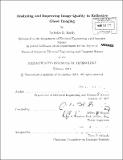Analyzing and improving image quality in reflective ghost imaging
Author(s)
Hardy, Nicholas D. (Nicholas David)
DownloadFull printable version (5.058Mb)
Other Contributors
Massachusetts Institute of Technology. Dept. of Electrical Engineering and Computer Science.
Advisor
Jeffrey H. Shapiro.
Terms of use
Metadata
Show full item recordAbstract
Ghost imaging is a transverse imaging technique that relies on the correlation between a pair of light fields, one that has interacted with the object to be imaged and one that has not. Most ghost imaging experiments have been performed in transmission. and virtually all ghost imaging theory has addressed the transmissive case. Yet stand-off sensing applications require that the object be imaged in reflection. We use Gaussian-state analysis to develop expressions for the spatial resolution, image contrast. and signal-to-noise ratio for ghost imaging performed by measuring a fraction of the light that reflects off a rough-surfaced object that creates target returns with fully developed speckle. This is done for a pseudothermal source with phase-insensitive classical correlation between the two fields, and for a quantum source with non-classical phase-sensitive correlation between the fields. In the low flux limit this quantum source becomes the biphoton state. We compare our results to the corresponding behavior seen in transmissive ghost imaging, and we develop performance results for the reflective form of computational ghost imaging. We also provide a preliminary stand-off sensing performance comparison between reflective ghost imaging and a conventional direct-detection laser radar system. We also consider the resolution degradation on each system when the fields propagate through turbulence. Finally, we investigate ways of increasing the signal-to-noise ratio of reflective ghost imaging through use of multiple bucket detectors. multiple-wavelength sources, and compressive sensing.
Description
Thesis (S.M.)--Massachusetts Institute of Technology, Dept. of Electrical Engineering and Computer Science, 2011. Cataloged from PDF version of thesis. Includes bibliographical references (p. 91-93).
Date issued
2011Department
Massachusetts Institute of Technology. Department of Electrical Engineering and Computer SciencePublisher
Massachusetts Institute of Technology
Keywords
Electrical Engineering and Computer Science.